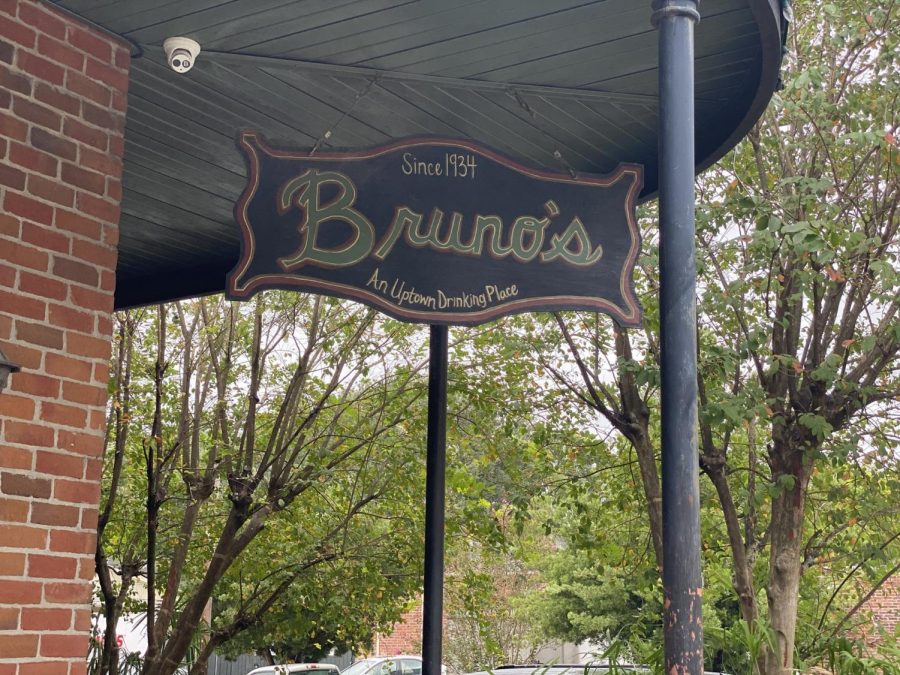Coronavirus restrictions put Big Easy bars in a bind
A sign hangs outside of Bruno’s Tavern on Aug. 22. Bruno’s is one of many bars in New Orleans that is struggling with new restrictions due to COVID-19. Photo credit: Shadera Moore
September 7, 2020
As Phase 2 of reopening rages on, bars and restaurants are struggling to stay afloat amid statewide restrictions on alcohol sales.
The official Phase 2 mandate that was enforced by Gov. John Bel Edwards July 13 required that all bars and restaurants must serve food, open at a 50% capacity, require strict social distancing along with a mask and, most controversially, not serve to-go drinks. These restrictions have since been extended until Sept. 11.
Until then, all bars without a Louisiana Department of Health food permit are unable to serve customers.
For a dual establishment such as Bruno’s Tavern, a busy day is a diamond in the rough.
“The stress load has become more exponential the longer this thing strings out. We are hoping that come October, or even before that, we can open at full capacity. For the sake of the city, that time will be a making or breaking point for a lot of businesses,” William Wilson, general manager of Bruno’s Tavern said.
Wilson said he is glad the bar is still in business, but he is frustrated by the ban on to-go drinks.
“The whole situation is funny to me. New Orleans has been one of the only places where to-go drinks were allowed, now we are one of the few cities that do not allow it. I honestly do not see where it solves anything because people are going to do whatever they want regardless,” Wilson said.
Despite Wilson’s disagreement with the policy, Bruno’s Tavern serves all of its drinks in a glass so that people do not have to-go beverages.
Wilson feels the mandate was mainly targeted at Bourbon Street, but effected all bars as a result.
“It was an umbrella policy mainly focused on the tourist areas. From what I have seen, no one in Uptown was doing anything that affected the COVID count. It has hurt the revenue stream for a lot of businesses. At the end of the day, we have to be using common sense, especially with the college crowd coming in. We keep everyone masked and everyone socially distanced,” Wilson said.
Jimmy Stephens, a New Orleans resident who has worked a plethora of jobs including as a paramedic, understands the importance of the no to-go policy, but said he also sees contradictions.
“As a public health professional for twenty years, I understand the health standpoint. I think if you come to a point where if you are mitigating the people on the street, then you are mitigating the potential for COVID-19,” he said. “But if there has not been a 311 complaint about bars and they are still following guidelines, do not close them down while people are still going to Bourbon Street and not complying,” Stephens said.
Despite the economic collapse in the city, Stephens still has hope in the city to turn things around in the long run.
“New Orleans is not like anywhere else because an overwhelming majority of people work in music, service industries, hospitality, tourism. There are very few white-collar jobs here. I know that the city is like a family, we will come back better and stronger with more love than ever before,” he said.
With reports of cases increasing and an economy facing a historic downfall, mayors of major cities across the country have submitted a letter to Congress of support for the “RESTAURANTS Act of 2020”, which is shorthand for Real Economic Support That Acknowledges Unique Restaurants Assistance Needed To Survive.
The bill proposes to provide $120 billion in grants through Dec. 31 to non-chain food and drinking establishments who have experienced a drop in revenue as a result of COVID-19.








